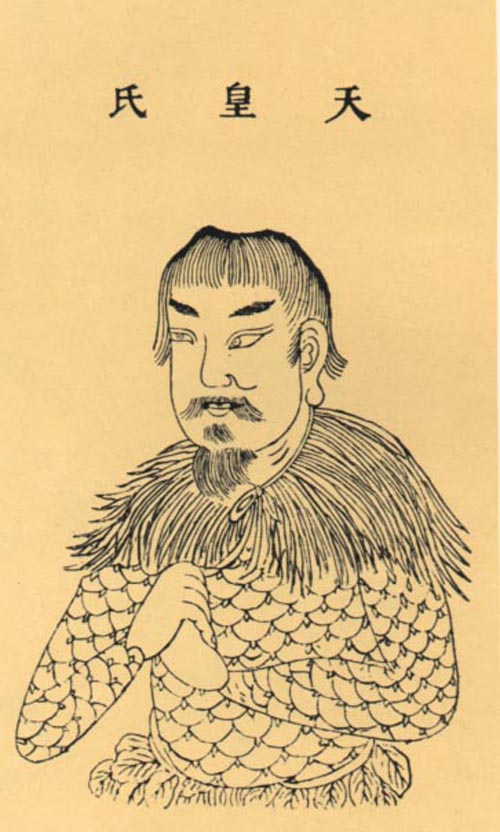Heavenly Sovereign on:
[Wikipedia]
[Google]
[Amazon]
 The Heavenly sovereign () was the first Chinese legendary king after
The Heavenly sovereign () was the first Chinese legendary king after
 The Heavenly sovereign () was the first Chinese legendary king after
The Heavenly sovereign () was the first Chinese legendary king after Pangu
Pangu (, ) is a primordial being and creation figure in Chinese mythology who separated heaven and earth and became geographic features such as mountains and rivers.
Legends
The first writer to record the myth of Pangu was Xu Zheng during t ...
’s era. According to ''Yiwen Leiju
The ''Yiwen Leiju'' is a Chinese ''leishu'' encyclopedia completed by Ouyang Xun in 624 under the Tang dynasty, Tang. Its other contributors included Linghu Defen and Chen Shuda.
It is divided into 47 sections and many subsections. It covers a ...
'', he was the first of the Three Sovereigns.Name
The book Lushi from theSong Dynasty
The Song dynasty (; ; 960–1279) was an imperial dynasty of China that began in 960 and lasted until 1279. The dynasty was founded by Emperor Taizu of Song following his usurpation of the throne of the Later Zhou. The Song conquered the rest ...
records that his family name was Wang(望),his given name
A given name (also known as a forename or first name) is the part of a personal name quoted in that identifies a person, potentially with a middle name as well, and differentiates that person from the other members of a group (typically a ...
was Huo(獲) and his courtesy name
A courtesy name (), also known as a style name, is a name bestowed upon one at adulthood in addition to one's given name. This practice is a tradition in the East Asian cultural sphere, including China, Japan, Korea, and Vietnam.Ulrich Theob ...
was Zirun(子潤).
Biography
According to the "Basic Annals of the Three Sovereigns" (三皇本紀) inSima Zhen
Sima Zhen (; 679–732), courtesy name Zizheng (Tzu-cheng; 子正), was a Tang dynasty Chinese historian born in what is now Jiaozuo, Henan.
Sima Zhen was one of the most important commentators on the ''Shiji
''Records of the Grand Histo ...
’s supplement to the ''Records of the Grand Historian
''Records of the Grand Historian'', also known by its Chinese name ''Shiji'', is a monumental history of China that is the first of China's 24 dynastic histories. The ''Records'' was written in the early 1st century by the ancient Chinese his ...
'':Sima Zhen
Sima Zhen (; 679–732), courtesy name Zizheng (Tzu-cheng; 子正), was a Tang dynasty Chinese historian born in what is now Jiaozuo, Henan.
Sima Zhen was one of the most important commentators on the ''Shiji
''Records of the Grand Histo ...
. 補史記 (Supplement to the ''Records'') (second-to-last paragraph)
*After the Heaven and the Earth were formed, there was Tiānhuáng, who had twelve heads, cast his magic to fill the Earth with water.
*The king was said to have an unselfish personality(or in a calm state or living in retirement) that even if he did not try to help the people, people's customs changed for the better.(澹泊無所施為,而民俗自化)
*And, Tiānhuáng was a king of many achievements. He lived to 18,000 years old. His twelve children supported him in reigning the world
In its most general sense, the term "world" refers to the totality of entities, to the whole of reality or to everything that is. The nature of the world has been conceptualized differently in different fields. Some conceptions see the worl ...
.
*His greatest achievement was suppressing all the chaos, dividing the world for the many tribes, and choosing the best people to rule the tribes.
His successor was the Earthly Sovereign The Earthly Sovereign () was the second China, Chinese legendary king after Pangu's era. According to ''Yiwen Leiju'', he was the second of the Three Sovereigns and Five Emperors, Three Sovereigns.
Biography
According to the "Basic Annals of the ...
.
According to the ''Yiwen Leiju
The ''Yiwen Leiju'' is a Chinese ''leishu'' encyclopedia completed by Ouyang Xun in 624 under the Tang dynasty, Tang. Its other contributors included Linghu Defen and Chen Shuda.
It is divided into 47 sections and many subsections. It covers a ...
'',
*Based on ''Shixue'' (始學) by Xiang Jun, after the heaven and earth were formed, there was the Heavenly Sovereign, with 13 heads(or 13 leaders). He was called Tianling (天靈, ‘heavenly spirit’) and ruled the world for 18,000 years.
*Based on ''Dongming Ji'' ( 洞冥記), there were 13 people with the same family name.
*Based on the records in the ''Three Five Historic Records'' (三五歷紀) by Xu Zheng, when history began, life started to exist, and there was a divine spirit that had 13 heads called Tianhuang.
*Based on ''Chunqiu Wei'' (春秋緯), there were Heavenly, Earthly and Heavenly Sovereigns, they had 9 brothers and divided the world into the Nine Provinces, which spanned the world.
*Based on ''Dunjiakaishan Tu'' (遁甲開山圖), the emperor's remains are said to be under the Kunlun
The Kunlun Mountains ( zh, s=昆仑山, t=崑崙山, p=Kūnlún Shān, ; ug, كۇئېنلۇن تاغ تىزمىسى / قۇرۇم تاغ تىزمىسى ) constitute one of the longest mountain chains in Asia, extending for more than . In the bro ...
in Zhuzhou (柱州).
See also
*Chinese mythology
Chinese mythology () is mythology that has been passed down in oral form or recorded in literature in the geographic area now known as Greater China. Chinese mythology includes many varied myths from regional and cultural traditions.
Much of t ...
* Three Sovereigns and Five Emperors
References
, - {{end Three Sovereigns and Five Emperors Chinese monarchs